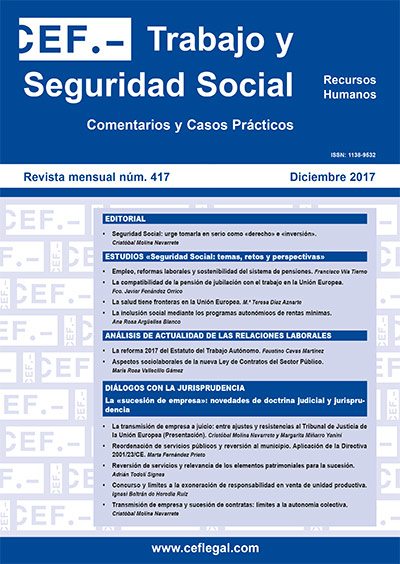Emotional competences in people management
DOI:
https://doi.org/10.51302/rtss.2017.1734Keywords:
emotional competences, emotional intelligence, human resources, people managementAbstract
Competence management is the reference model in many companies to recruit, develop, motivate and engage their employees. This model distinguishes between technical-professional competences (knowledge, skills and attitudes related to the specific performance of the job) and socio-personal competences (knowledge, skills and attitudes related to the social and personal interaction of the worker). Within this last group would be emotional competences such as motivation, self-confidence, self-control, tolerance to stress, assertiveness or empathy. Although the best known model in the business world is that of emotional intelligence, there are several theoretical proposals that are antecedents of this model and others that have been derived as consequence of the advance of the investigation in this area. Research shows that emotional competences have a role important in the prediction of different organizational variables such as performance or commitment and also those they can have a cushioning role in situations of work stress or burnout. However, there is ambiguity in the definition of these competences within the job profiles that may hinder their application in the different areas of the management of people in the organizations.
Downloads
References
Armstrong, T. [2006]: Inteligencias múltiples en el aula. Guía práctica para educadores, Madrid: Paidós.
Bisquerra, R. [2009]: Psicopedagogía de las emociones, Madrid: Síntesis.
Bisquerra, R. y Pérez, N. [2007]: «Las competencias emocionales», Educación XXI, 10, págs. 61-82.
Brackett, M.; Rivers, S. y Salovey, P. [2011]: «Emotional intelligence: implications for personal, social, academic and workplace success», Social and Personality Psychology Compass, 5 (1), págs. 88-103. https://doi.org/10.1111/j.1751-9005.2010.00334x
Caballero, D. y Blanco, A. [2007]: «Competencias para la flexibilidad. La gestión emocional de las organizaciones», Psicothema, 17 (49), págs. 616-620.
Côté, S. [2014]: «Emotional Intelligence in Organizations», Annual Review Organizational Psychology and Organizational Behavior, 1, págs. 459-488. https://doi.org/101149/annurev-orgpsych-031413-091233.
Del Pozo, M. [2005]: Una experiencia a compartir: las inteligencias múltiples en el Colegio Montserrat, Barcelona: Fundación M. Pilar Más.
Demerouti, E.; Bakker, A. B.; Nachreiner, F. y Schaufeli, W. B. [2001]: «The job demands-resources model of burnout», Journal of Applied Psychology, 86 (3), págs. 499-512. https://doi.org/10.1037/0021-9010.86.3.499
García-Sáiz, M. [2011]: «Una revisión constructiva de la gestión por competencias», Anales de Psicología, 27 (2), págs. 473-497.
Gardner, H. [2005]: Inteligencias múltiples: teoría en la práctica, Barcelona: Paidós Ibérica.
— [1983]: Frames of mind: The theory of multiple intelligences, Nueva York: Basic Books.
Giorgi, G. [2013]: «Organizational emotional intelligence. Development of a model», International Journal of Organizational Analysis, 21 (1), págs. 4-18. https://doi.org/10.1108/19348831311322506
Goleman, D. [1998]: La práctica de la inteligencia emocional, Barcelona: Kairós.
— [1995]: Inteligencia emocional, Barcelona: Kairós.
Goleman, D.; Boyatzis, R. y McKee, A. [2002]: Primal leadership: learning to lead with emotional intelligence, Boston: Harvard Business School Press.
Gross, J. [1998]: «The emerging field of emotion regulation: An integrative review», Review of General Psychology, 2, págs. 271-299.
Mayer J. y Salovey, P. [1997]: «What is emotional intelligence?», en Salovey, P. y Sluyter, D. (eds)., Emotional Development and Emotional Intelligence: Implications for Educators, Nueva York: Basic Books, págs. 3-31.
Mestre, J. y Fernández-Berrocal, P. [2007]: Manual de inteligencia emocional, Madrid: Pirámide.
Ponti, J. y Cabañas, B. [2004]: «Inteligencia emocional: la hora de la verdad. Lo que piensan los directivos españoles sobre la revolución en la inteligencia propuesta por Goleman», Capital Humano, 174, págs. 78-80.
Prieto, M. y Ferrándiz, C. [2001]: Inteligencias múltiples y curriculum escolar, Málaga: Aljibe.
Salanova, M.; Martínez, I. y Llorens, S. [2004]: «Psicología organizacional positiva», en Palací, F. (coord.), Psicología de la organización, Pearson-Prentice Hall, págs. 349-376.
Salovey, P. y Mayer, J. [1990]: «Emotional intelligence», Imagination, Cognition, and Personality, 9, págs. 185-211.
Schaufeli, W. B. y Bakker, A. B. [2004]: «Job demands, job resources and their relationship with burnout and engagement: a multi-sample study», Journal of Organizational Behavior, 25, págs. 293-315, https://doi.org/10.1002/job.248
Sempere, P. [2017]: «El directivo español, un perfil confundido e infrautilizado», disponible en https://cincodias-elpais-com.cdn.ampproject.org/c/cincodias.elpais.com/cincodias/2017/04/10/fortunas/1491838127_335638.amp.html
Sony, M. y Mekoth, N. [2016]: «The relationship between emotional intelligence, frontline employee adaptability, job satisfaction and job performance», Journal of Retailing and Consumer Services, 30, págs. 20-32, http://dx.doi.org/10.1016/j.jretconser.2015.12.003
Tovar, F. y Revilla, J. [2010]: «La supuesta neutralidad de la evaluación por competencias», Revista Internacional de Organizaciones (5), págs. 109-126.
Vivas, M.; Gallego, D. y González, B. [2006]: Educar las emociones, Madrid: Dickynson.



















